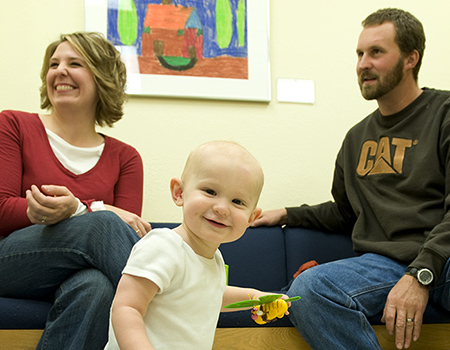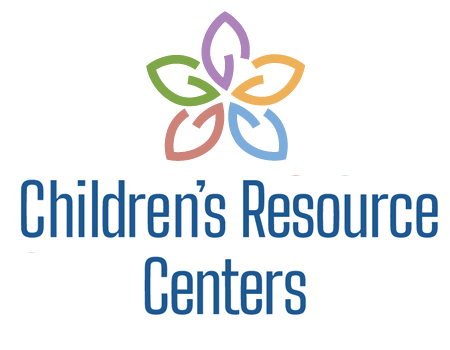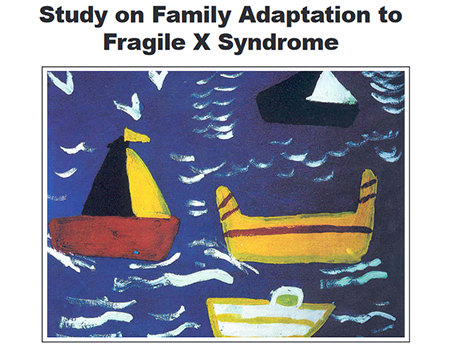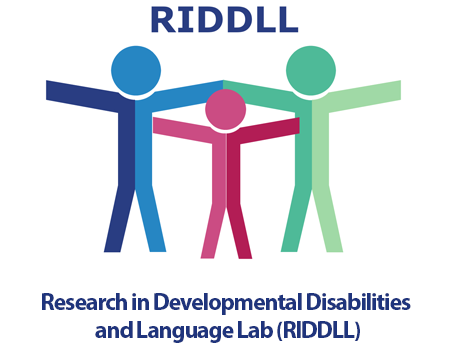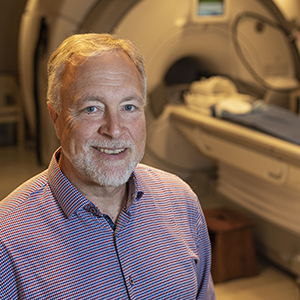 Fragile X syndrome is the leading inherited cause of intellectual disability, as well as the source of many cases of learning disabilities and autism. The syndrome affects both males and females, although males are typically more severely affected. In addition to learning difficulties, children with fragile X often suffer from hyperactivity, social anxiety, hypersensitivity to sensory stimuli, and autism and autistic-like behaviors, all of which limit their social and academic progress, create challenges for teachers, and are a source of stress and uncertainty for their families.
Fragile X syndrome is the leading inherited cause of intellectual disability, as well as the source of many cases of learning disabilities and autism. The syndrome affects both males and females, although males are typically more severely affected. In addition to learning difficulties, children with fragile X often suffer from hyperactivity, social anxiety, hypersensitivity to sensory stimuli, and autism and autistic-like behaviors, all of which limit their social and academic progress, create challenges for teachers, and are a source of stress and uncertainty for their families.
Fragile X is caused by a repetitive genetic error on the long arm of the X chromosome. The mutation is in a single gene called FMR1. A small set of nucleotides (the building blocks of DNA) are repeated excessively, disrupting the structure of the gene and preventing the production of its normally encoded protein (FMRP). The mutation is passed through families and can occur more frequently or severely in future generations.
Read more about it here.
Hub Page Contents
Services
Clinical Services
The Waisman Center's Autism and Developmental Disabilities Clinic offer specialized diagnostic and assessment services to individuals who have, or are suspected of having a variety of developmental disabilities including fragile X syndrome. The clinic team works closely to provide comprehensive and integrated evaluations.
UCEDD
The mission of the Waisman Center, University Center for Excellence in Developmental Disabilities (UCEDD) is to support the full inclusion and self determination of people with developmental disabilities and their families. Autism is a major area of focus.
Children's Resource Center-South
Guiding Wisconsin families of children and youth with special health care needs. We are parents and professionals who can help get answers, find services, connect you to community resources, provide trainings, and support you on your journey.
Research
National Fragile X Research Registry
The National Fragile X Research Registry’s goal is to forward fragile X research by connecting scientists with a large number of families affected by fragile X syndrome and its associated conditions. This registry is a growing collaboration between the Waisman Center and the Carolina Institute on Developmental Disabilities at the University of North Carolina-Chapel Hill.
Research Results - Family Reports
The documents on fragile x syndrome & FMR1-associated conditions were developed by the Lifespan Family Research lab at the Waisman Center. Investigators Marsha Mailick, PhD and Leann DeWalt, PhD, seek to understand how families are affected by variations in the FMR1 gene.
LEADer Study (A. Sterling)
The relationship between language and executive function in DLD and FXS over time (LEADer Study) The purpose of this research is to better understand how skills related to executive function like memory and flexible thinking are related to grammar and language comprehension and production in children with FXS, DS, and DLD, and a comparison group of neurotypical children.
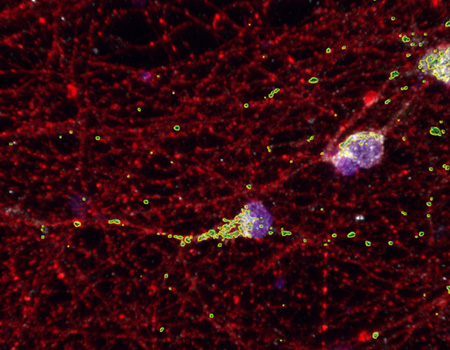
Fragile X Syndrom-Related Research at Waisman
- Brain imaging (Alexander)
- Community Research Participation (Ausderau)
- Screening for FMR1 gene CGG repeats (Baker)
- Development of the cerebral cortex in FX (Bhattacharyya & Zhao)
- FMR1 gene variations and affects (Mailick & DaWalt)
- Language Development (Sterling)
- Biostatistics (Wang)
Fragile X Syndrome & FMR1 News
Fragile X Syndrome News

Health trajectory of mothers of children with developmental disabilities shows a ‘wear-and-tear’ effect starting around age 65
Mothers of children with developmental disabilities experience long-term stress, adapting for many years but showing signs of ‘wear-and-tear’ starting around age 65, affecting their physical and mental health.
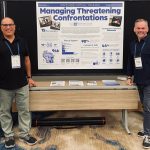
Statewide success: Managing threatening confrontations training enhances disability support for thousands
It focuses on teaching proactive and positive strategies for supporting individuals with disabilities through a broad range of behaviors and escalation levels.
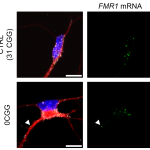
Building a better understanding of genetic repeats and their role in fragile X syndrome
Genetic repeats—a sequence or segment of DNA that is repeated over and over in a row—is a typical part of the genome. However, when there is an atypical number of repeats in the DNA sequence, it can lead to impaired gene function and be the cause of more than 50 expansion conditions including fragile X syndrome (FXS).
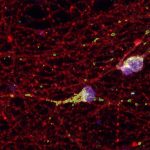
Discovery reveals mitochondria as potential treatment target for fragile X syndrome
Fragile X syndrome, the most common form of inherited intellectual disability, may be unfolding in brain cells even before birth, despite typically going undiagnosed until age 3 or later.

New research expands understanding of impact of rapamycin on fragile X syndrome
Fragile X syndrome (FXS) is the most common heritable form of intellectual and developmental disability. It is also the most common single genetic contributor to autism spectrum disorder (ASD).
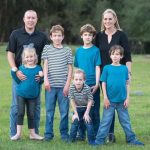
The large scope of research on fragile X syndrome at the Waisman Center
Research studies at the Waisman Center cover both basic science and behavioral research on FXS, starting with the individual, up to the family unit, from childhood, and into old age.

Waisman investigator one of 12 to receive a Kellett Mid-Career Award
Xinyu Zhao, PhD, Waisman investigator and professor of neuroscience, was recently awarded a Kellett Mid-Career Award, among 11 others, by the Office of the Vice Chancellor for Research and Graduate Education.
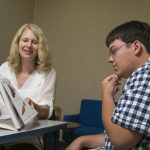
Boys with fragile X syndrome + autism spectrum disorder and autistic boys show high rates of word omission during conversations
A recent study shows that boys with fragile X syndrome and co-occurring ASD (fragile X + ASD), and autistic boys have similar patterns of linguistic errors and omit more words in conversations compared to non-autistic boys.

A college degree may protect against neurodegeneration in genetically at-risk populations
Obtaining a college degree may be protective against neurodegenerative symptoms in women with an elevated genetic risk.
- More Fragile X Syndrome posts
Resources & Services
Resources & Services
 Research Participation | 800.965.9205; 608.263.5192; registry@waisman.wisc.edu; Participate in Research
Research Participation | 800.965.9205; 608.263.5192; registry@waisman.wisc.edu; Participate in Research
The Waisman Center’s Research Registry links individuals and families to research projects at the Waisman Center. The Waisman Center maintains a confidential registry of families and individuals who would like to be contacted about upcoming research projects. Enrollment in the Research Registry does not obligate an individual or family to participate in any study.
 Community Outreach for Children with Challenging Behaviors | 608-265-9438; cow.waisman.wisc.edu/ties
Community Outreach for Children with Challenging Behaviors | 608-265-9438; cow.waisman.wisc.edu/ties
Community Training, Intervention and Evaluations Services (TIES) is an outreach program for children and adults with developmental disabilities who present various challenging behaviors, including withdrawal, aggression and self-injury. The mission of Community TIES is to address behavioral, psychological, and emotional needs using therapeutic approaches that insure continued participation in the community. TIES provides counseling, crisis response, psychiatric consultation, parent education and support, and training for personnel and program consultation in local human service agencies. Directed by Josh Lapin, MSW, and funded by Dane County, this program maintains an active caseload of approximately 250 children and adults in Dane County.
 Finding Your Way: Videos for Families | wicii.waisman.wisc.edu/training/fyw-videos/
Finding Your Way: Videos for Families | wicii.waisman.wisc.edu/training/fyw-videos/
Finding Your Way is a video series for families and caregivers of children with intellectual and developmental disabilities. The videos provide information on services and resources for children with disabilities in Wisconsin. Topics include the Birth to Three Program, Children's Long-Term Supports Program (CLTS)/Children's Community Options Program (CCOP), Early Childhood Special Education, Head Start/Early Head Start, Home Visiting Programs, Katie Beckett Medicaid, Outpatient Therapy, and Supplemental Security Income (SSI).
 Moving to Adult Health Care: A 6-Part Toolkit Series for Health Care Transition | https://movingtoadulthealthcare.org/toolkits/
Moving to Adult Health Care: A 6-Part Toolkit Series for Health Care Transition | https://movingtoadulthealthcare.org/toolkits/
These toolkits aim to help you learn and get ready for moving to adult health care and living a healthy adult life. They will give you lots of information and resources to help you during this time of transition. Each toolkit will focus on a different topic about health care transition.
 Wisconsin Wayfinder: Essential Children's Resources | 877-947-2929; dhs.wisconsin.gov/wiscway/
Wisconsin Wayfinder: Essential Children's Resources | 877-947-2929; dhs.wisconsin.gov/wiscway/
Wisconsin Wayfinder supports families of children with delays, disabilities, special health care needs, and mental health conditions. Children’s resource guides are helpers who assist families, caregivers, professionals, and organizations in finding a wide array of supports and services available through the Children’s Resource Network. Their services are free and confidential. Connect with a children's resource guide. Call (877) WiscWay or use our contact form.
 Well Badger Resource Center | 800-642-7837; text: 608-360-9328; help@wellbadger.org; https://www.wellbadger.org/
Well Badger Resource Center | 800-642-7837; text: 608-360-9328; help@wellbadger.org; https://www.wellbadger.org/
When you have questions about health and social services, figuring out where to go when you need help can be overwhelming. We’re here to make it easier. Well Badger Resource Center is your one-stop connection to community, social, health, and government programs — a place to find what you need, when you need it.

